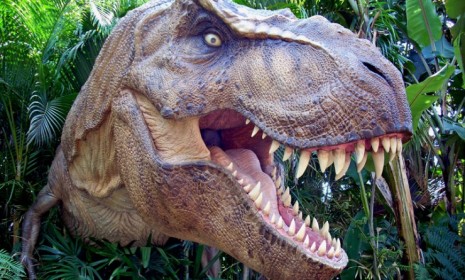Why we'll never have a real-life Jurassic Park
Bad news, dino fans. New research suggests that DNA decomposes far too fast for us to clone any ancient beasts

A free daily email with the biggest news stories of the day – and the best features from TheWeek.com
You are now subscribed
Your newsletter sign-up was successful
Back in April, an eccentric Australian billionaire revealed grandiose plans for a real-life Jurassic Park — replete with cloned dinosaurs — on a remote resort in southern Queensland. Unfortunately for him (and kids everywhere) that dream will probably never become a reality. A new study published in the Proceedings of the Royal Society B finds that the DNA required to genetically engineer ancient creatures breaks down at a rate far too fast for dino-dreamin' scientists to effectively use. Here's what you should know:
What exactly did researchers do?
A team of paleo-geneticists from the University of Copenhagen and Murdoch University in Perth, Australia, examined 158 leg bones belonging to a species of long-extinct giant birds to determine exactly how much genetic information was still intact. All of the bones were collected from within 5 kilometers of each other, and ranged in age from 600 to 8,000 years old.
The Week
Escape your echo chamber. Get the facts behind the news, plus analysis from multiple perspectives.

Sign up for The Week's Free Newsletters
From our morning news briefing to a weekly Good News Newsletter, get the best of The Week delivered directly to your inbox.
From our morning news briefing to a weekly Good News Newsletter, get the best of The Week delivered directly to your inbox.
How much readable DNA was left?
Sadly, not enough to clone anything. Each bone contained extremely faint traces of the flightless bird's DNA, but the team discovered that DNA has a half-life of just 521 years, and external conditions like temperature, bacteria, and oxygenation typically speed up the decay process. "That means that after 521 years, half the bonds between nucleotides in the backbone of a sample would have broken," says Matt Kaplan at Nature. After another 521 years, all of the bonds would be broken, meaning there isn't enough DNA to clone anything. "Your beautiful Jurassic Park dreams have just been crushed with Jurassic Park III levels of disappointment," says Brian Barret at Gizmodo.
What if the DNA is preserved in amber? Or frozen?
"Absolutely ideal conditions" might help DNA "hang around for several thousand years," says Ian Steadman at Wired. Unfortunately, the last dinosaur died 65 million years ago.
A free daily email with the biggest news stories of the day – and the best features from TheWeek.com
So there's no hope?
The possibility of recreating a dinosaur is looking increasingly grim. In 2009, a few researchers raised the possibility of reverse-engineering one from chicken genes to make the squawky birds more like their ancient ancestors — not exactly the same thing as cloning a giant, fearsome lizard. Perhaps the ultimate lesson of Jurassic Park was right, says Wired's Steadman. "Man and dinosaur were not meant to coexist."
Sources: Gizmodo, Nature, Popular Science (2), Wired
-
 Quentin Deranque: a student’s death energizes the French far right
Quentin Deranque: a student’s death energizes the French far rightIN THE SPOTLIGHT Reactions to the violent killing of an ultra-conservative activist offer a glimpse at the culture wars roiling France ahead of next year’s elections.
-
 Secured vs. unsecured loans: how do they differ and which is better?
Secured vs. unsecured loans: how do they differ and which is better?the explainer They are distinguished by the level of risk and the inclusion of collateral
-
 ‘States that set ambitious climate targets are already feeling the tension’
‘States that set ambitious climate targets are already feeling the tension’Instant Opinion Opinion, comment and editorials of the day